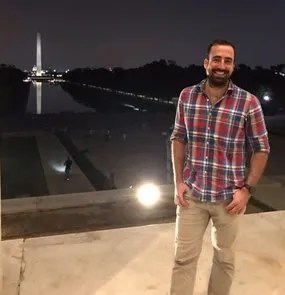Advocate Spotlight: Ben White

Tell us a little bit about yourself and how you got connected with the Cancer Support Community.
I was a helicopter pilot in the U.S. Navy when I began to suffer from all the tell-tale symptoms of colorectal cancer. After many months of difficult workups and being told repeatedly that I was too young to have colon cancer, I was admitted for what was supposed to be an exploratory procedure that became an emergency colectomy to remove a lemon sized tumor in my colon. I woke up with an ostomy and a cancer diagnosis of stage 3B colon cancer. At just 26 years old, it was extremely jarring to hear that diagnosis. At the time I was stationed in Jacksonville, Florida while all my family was across the country in California, where I grew up. I started treatment in Florida, and the Navy expedited my move to California so that I could be close to family and caregiver support. Over the next 6 months I did 12 rounds of chemotherapy and was able to reverse the ostomy after finishing chemo. I am now a little over 2 years NED (no evidence of disease).
Following treatment, my chemotherapy left me with permanent residual side effects, particularly peripheral neuropathy. These long-term side effects, coupled with my cancer diagnosis, led the Navy to find me unfit for duty and I separated from service in late 2018. At this point I was frustrated. I didn’t have much of a cancer community, as people with my diagnosis were generally 3 times my age, I didn’t have any answers (I had no family history and tested negative for Lynch Syndrome and other genetic markers), and I was tired of the “sorry, we can’t explain this” answers I would receive from doctors.
I love to travel and so post-treatment I took some time and spent a few months in Europe and Southeast Asia. In total I saw 14 new countries, a lot of the time as a solo traveler, and it was phenomenal experience especially after being sick. I got to do the things that I told myself I was going to do when I was sitting in that infusion chair. I also began volunteering at my local American Cancer Society and became involved with the Colon Club, a small nonprofit focused on educating as many people as possible, specifically young adults, about colorectal cancer, as well as connecting young adults diagnosed with colorectal cancer so they never have to feel alone. It was through my involvement with the Colon Club that led me to then find Fight Colorectal Cancer (CRC), and when the opportunity to share my story through their Lobby Day arose, I jumped at it. I knew advocacy was a passion of mine and so once I was back home from my travels and looking for roles in cancer patient advocacy, I found Cancer Support Community.
Did you have experience with advocacy in any capacity before joining CSC? (e.g. legislator meetings, hosting educational events, writing letters or calling, writing pieces for media outlets, posting on your personal Facebook, sharing information with your community, etc.)
Prior to joining CSC, I participated in Lobby Days with Fight CRC and ACS CAN at the state and federal level and found it very powerful to share my story with my elected officials and the community at large. People are always surprised to hear how young I was when I was diagnosed with a cancer where the average age is 68, and how little data or research there is out there about colorectal cancer in young adults. This is why continued advocacy efforts are so important in order to ensure that there is a constant stream of research funding and policies that allow people to have access to high quality, affordable, and comprehensive cancer care. At CSC, I have supported CPI programs like the recent Utilization Management Summit and the upcoming Lobby Day. I also circulate cancer advocacy and education content online through my social media. I’ve found it to be very empowering to hear that friends, or even strangers, who have seen my story have, as a result, taken action on their own health.
Is there one issue you are particularly passionate about?
One policy issue that I’m particularly passionate about is the Removing Barriers to Colorectal Cancer Screening Act, HR 1570/S 668, which would close the colonoscopy loophole. Currently, Medicare covers screening colonoscopies at 100%, but if polyps are removed during the screening procedure, Medicare beneficiaries are responsible for paying coinsurance of about 20% (upwards of $300). This additional and unexpected cost is a major barrier to screening. It has been a decade of trying to close this colonoscopy loophole and hopefully it will be done in this Congress.
What is one tip or piece of advice you’d like to share with others who are interested in becoming an advocate?
Remember that your voice and your story matter, especially when connecting with your elected officials. They represent you, they serve you, and they will listen to you.
Tell us something fun about yourself—any hobbies, interests, or fun facts?
After treatment, I picked up woodworking as a hobby. While I can’t say I could build a canoe like Nick Offerman just yet, I enjoy woodworking when I’m back in California (my studio apartment here in D.C. sadly can’t hold a woodworking studio!). I love to cook and am also a proud dog dad to Izzy, a German shepherd mix.
If you are interested in learning more about policy, advocacy, and ways to get involved, sign up to be a part of the Grassroots Network!